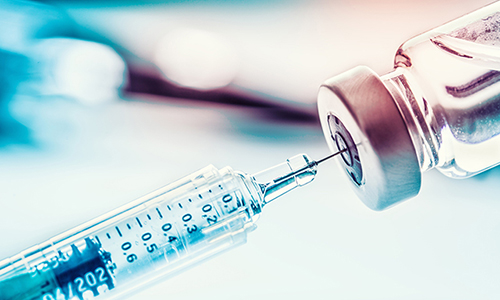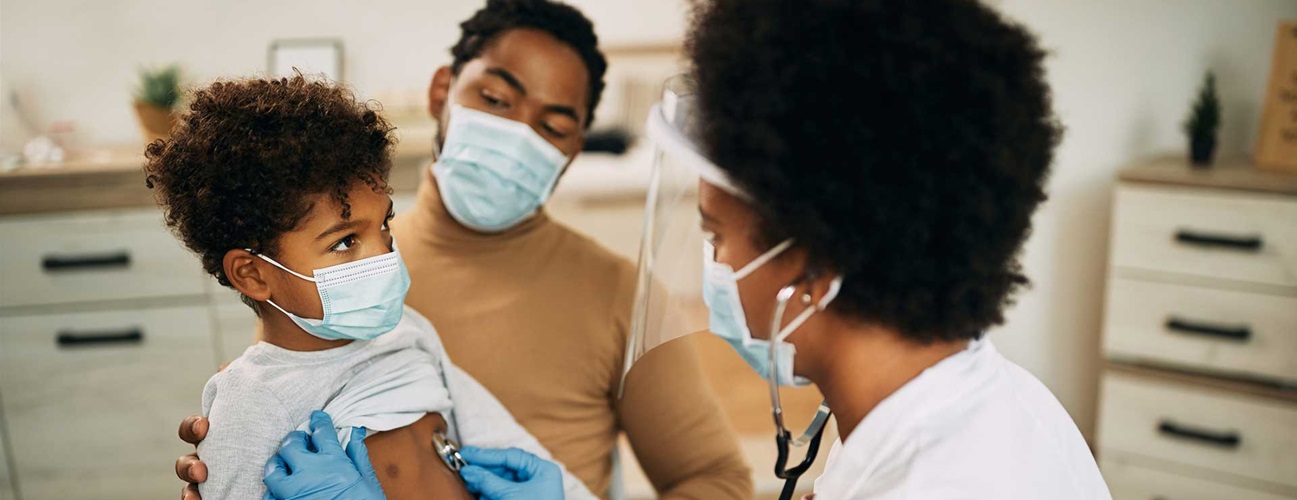COVID Vaccine: What Parents Need to Know
Featured Experts:
Pediatricians Anna Sick-Samuels, M.D., M.P.H., of Johns Hopkins Children’s Center, and Allison Messina, M.D., of Johns Hopkins All Children’s Hospital, answer questions for parents and guardians.
Can my child get a COVID-19 vaccine?
The U.S. Food and Drug Administration (FDA) authorized and the Centers for Disease Control and Prevention (CDC) now recommends COVID-19 vaccines for everyone 6 months and older, and boosters for everyone 5 and older. You are up to date on your vaccines and boosters when you have received all doses in the primary series and all boosters recommended for you, when eligible. For details, please review the CDC’s COVID-19 vaccine recommendations.
We encourage you to use all available local and state resources, including retail pharmacies, to get the COVID-19 vaccine.
Can my child get a COVID booster?
Yes, depending on age and immune status. For children, the CDC recommends:
- Children age 5–17 can receive a Pfizer-BioNTech booster.
- Children ages 12 and older who have certain medical conditions associated with immunosuppression can receive an additional booster. Please review the CDC’s booster guidelines for those who are moderately or severely immunocompromised.
What are COVID vaccine side effects that may be seen in infants and young children?
Your child might notice pain at the injection site (upper arm) and could feel more tired than usual. Fever, irritability, or drowsiness are also possible. These side effects are usually temporary and generally clear up within 48 hours.
Should I consider getting my child vaccinated for COVID-19?
Yes. Experts, including those at Johns Hopkins, believe that there are many benefits:
The vaccine helps prevent kids from getting COVID-19: Although COVID-19 in children is sometimes milder than in adults, some kids infected with the coronavirus can get severe lung infections, become very sick and require hospitalization. This is especially important to remember in light of variants, which can be very contagious. “The current vaccines are still effective in preventing severe illness from current variants of the virus,” Sick-Samuels notes. Children can also have complications such as multisystem inflammatory syndrome in children that may require intensive care or long-lasting symptoms that affect their health and well-being. The virus can cause death in children, although this is rarer than for adults.
The vaccine helps prevent or reduce the spread of COVID-19: Like adults, children also can transmit the coronavirus to others if they’re infected, even when they have no symptoms. Getting the COVID-19 vaccine can protect the child and others, reducing the chance that they transmit the virus to others, including family members and friends who may be more susceptible to severe consequences of the infection.
Getting vaccinated for COVID-19 can help stop other variants from emerging: Cases of COVID-19 are increasing among children, and variants appear to be playing a role. Reducing viral transmission by getting vaccinated also reduces the virus’ chance to mutate into new variants that may be even more dangerous. However, the virus can transmit easily between unvaccinated children and adults, giving new variants a chance to emerge.
Having your child vaccinated for COVID can help restore a more normal life:“Getting vaccinated will also help keep children in school and participating in the things they enjoy,” Sick-Samuels says. “Children exposed to the coronavirus who are vaccinated are less likely to get infected, and so are more likely to be able to continue participating with less disruptions to school attendance and other activities.”
COVID-19 vaccines help protect the community: Another reason to strongly consider a COVID-19 vaccine for your child is to protect the health of those living and working in your area. Each child or adult infected with the coronavirus can transmit the virus to others in the community.
If this happens some of the people so infected will become quite sick themselves or further spread the virus to others who will become very sick, and maybe even die — all because of a preventable infection.
This transmission also provides a chance for the virus to mutate further and create a new variant that might prove more infectious or resistant to the available vaccines and therapies. Fewer overall infections among the population means less chance of severe infection and death in the community and of dangerous coronavirus variants emerging.
Let's Talk Health (Hablemos de Sauld) | The New Normal for Kids: During COVID-19 - Part I
Are there specific concerns for kids getting COVID vaccines?
The FDA and the CDC take vaccine safety precautions very seriously. They continue to examine the available clinical trial data before deciding whether to authorize vaccination among different age groups, and monitor the vaccines carefully for any signs of safety issues among the public.
Myocarditis in teens: Does the COVID vaccine cause heart problems?
Since April 2021, there have been more than a thousand reports of cases of myocarditis (inflammation of the heart muscle) and pericarditis (inflammation of the lining outside the heart) happening after some COVID-19 vaccinations in the United States, according to the U.S. Centers for Disease Control and Prevention (CDC).
Seek medical attention right away if, within a few days of receiving the second injection of an mRNA COVID-19 vaccination (Pfizer-BioNTech, Moderna), you or your child experiences chest pain, shortness of breath, or feelings of having a fast-beating, fluttering, or pounding heartbeat.
Considering the hundreds of millions of COVID-19 vaccine doses that have been administered, these reports are very rare. The problem occurs more often in adolescents (teens) and young adults, and in males. The myocarditis or pericarditis in almost all cases is mild and resolves quickly.
Dr. Messina notes that myocarditis is a much more common complication of having COVID-19 than from getting vaccinated.
Can I get COVID-19 from my child?
Yes, it is possible for a child infected with the coronavirus to transmit COVID-19 to another person. Data from some studies suggest that young children may be less likely than older children and adults to spread the coronavirus to others, but it can still happen.
Does going back to school increase my child’s risk of catching or transmitting the coronavirus?
The highly contagious variants of the coronavirus are a concern among those who have not been vaccinated, including children. With that in mind, the CDC has updated its recommendations for COVID-19 prevention in K-12 schools and recommends universal indoor masking by all students (age 2 and older), staff, teachers, and visitors to K-12 schools, regardless of vaccination status, as well as physical distancing and other precautions. Having your child or teen vaccinated as soon as he or she is eligible will help prevent infections and spread of COVID-19.
Vaccinations for Parents and Guardians
Would getting the COVID-19 vaccination protect me if my child gets COVID-19?
Yes. Staying up to date with your COVID-19 vaccines from Moderna and Pfizer each protect you from developing severe symptoms from COVID-19. The vaccines are very effective in preventing hospitalization and death from COVID-19. Learn more about the safety and effectiveness of the coronavirus vaccines.
COVID-19 Vaccine




